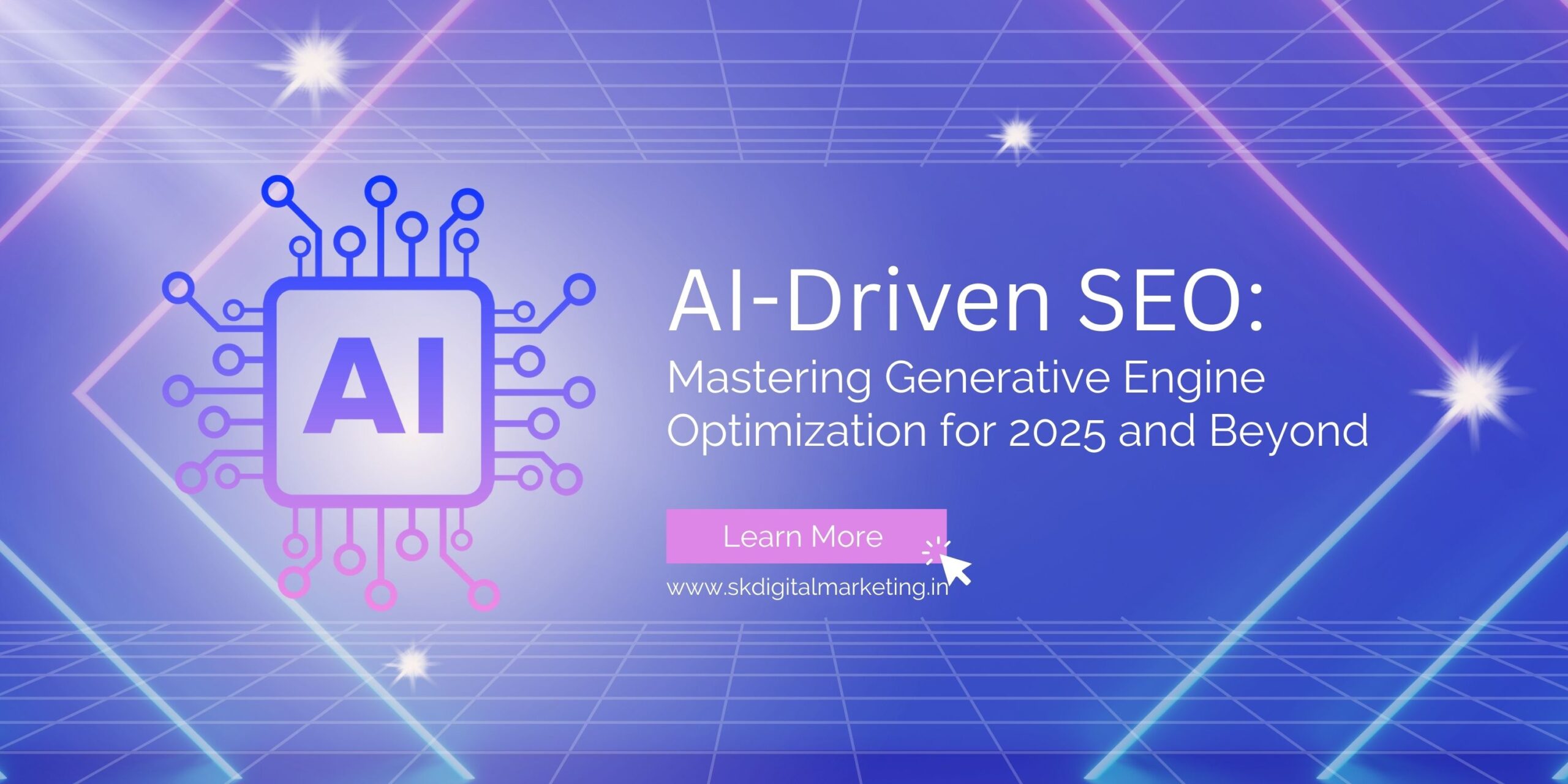Search engine optimization (SEO) has never stood still. From the early days of keyword stuffing to the rise of mobile-first indexing and the boom of voice search, businesses have always had to adapt to shifting digital landscapes. But in 2025, SEO is undergoing its most radical transformation yet, thanks to Artificial Intelligence (AI).
The spotlight is now on Generative Engine Optimization (GEO)—a new approach that helps brands stay visible in an era where search is no longer just about Google results. Instead, AI-driven platforms like ChatGPT, Gemini, Bing Copilot, and autonomous shopping agents are becoming the primary means by which users discover information.
This article explores what GEO means, why it matters, and how businesses can adapt to this AI-first world.
What is Generative Engine Optimization (GEO)?
Generative Engine Optimization (GEO) is the practice of optimizing your digital presence so that AI-powered search engines and assistants cite, summarize, and recommend your content in their generated responses.
Unlike traditional search results, which display a list of links, generative AI provides direct answers to user queries. For example, instead of sending someone to multiple websites, an AI engine may create a neatly packaged response—drawing from content across the internet.
If your brand’s insights, data, or product information are included in that summary, you become part of the conversation. If not, you risk being invisible, even if your website ranks well in classic search.
Why AI-Driven SEO is a Game-Changer
1. From Keywords to Context
Traditional SEO revolved around keywords and backlinks. AI-driven SEO, however, prioritizes semantic meaning and user intent. Search engines no longer just match words—they interpret context, relevance, and trustworthiness.
2. Content Becomes Knowledge
AI systems “learn” from structured and unstructured data. They don’t just crawl a page; they absorb insights. This makes accuracy, authority, and clarity more important than ever.
3. AI Shopping Agents Are Emerging
In e-commerce, AI shopping agents are now making decisions on behalf of users—comparing prices, checking reviews, and recommending products. If your product pages are not AI-optimized, you may be excluded from these AI-generated recommendations.
4. Voice and Conversational Search is Growing
As tools like Alexa, Siri, and Gemini get smarter, more users rely on conversational queries. Content must therefore sound natural and conversational, not robotic or keyword-heavy.
Strategies for AI-Driven SEO in 2025
To succeed in this new environment, brands need to shift their focus. Here are the most effective strategies for GEO:
1. Create AI-Friendly Content
- Write content that directly answers user questions.
- Use simple structures: clear headings, short paragraphs, and bullet points.
- Emphasize E-E-A-T (Experience, Expertise, Authoritativeness, Trustworthiness) so AI models recognize your authority.
2. Focus on First-Party Data
With the decline of third-party cookies, first-party data has become critical. Collect insights from your own customer base—through email subscriptions, loyalty programs, and surveys—and turn that into content AI can use as a trusted source.
3. Leverage Structured Data and Schema Markup
Adding schema markup helps AI engines understand what your page is about. For example:
- Product schema for e-commerce listings
- FAQ schema for knowledge-rich content
- Review schema for credibility
This makes your content more likely to appear in AI-generated snippets.
4. Embrace Conversational Content
Since AI favors natural, question-and-answer style writing, integrate FAQs, how-to guides, and tutorials into your website. Think about how real people would phrase queries in everyday language.
5. Go Multi-Format
AI engines don’t just learn from text. They also use data from videos, podcasts, infographics, and social media. Repurposing content into multiple formats increases your chances of being included in generative responses.
Real-World Example of GEO in Action
Imagine a user asks: “What are the best eco-friendly sneakers in 2025?”
- In traditional search, they would see a list of web links.
- With AI-driven search, the response could look like this:
“Brands like GreenStep, EcoRun, and EarthFit are leading in sustainable footwear. According to [Your Brand], recycled-material sneakers are among the top-rated eco-friendly options this year.”
Notice how the AI doesn’t just provide a link—it integrates brand mentions into its direct answer. With GEO strategies in place, your business could be featured in these AI-curated summaries, even if you don’t hold the top spot on Google.
The Human + AI Balance in SEO
One concern marketers often raise is whether AI will completely replace traditional SEO. The answer is no—but it will redefine it.
AI can analyze, summarize, and recommend content, but it still relies on human-created, high-quality information. This means:
- Human expertise remains vital for building trust.
- Authentic storytelling will continue to stand out.
- AI-optimized strategies will help amplify reach.
In other words, the future of SEO is not about competing with AI, but about collaborating with it.
Learn AI-Driven SEO With Us
If you want to master the latest skills in AI-driven SEO and Generative Engine Optimization, our institute SK Digital Marketing, offers specialized training designed for 2025 and beyond. From hands-on SEO strategies to AI-powered marketing tools, we provide practical learning that helps students, entrepreneurs, and professionals stay ahead in this evolving digital era. By joining our programs, you can learn how to apply GEO strategies effectively and make your brand future-ready.
Final Thoughts
The rise of AI-driven SEO and Generative Engine Optimization is reshaping the way brands connect with audiences. Instead of chasing algorithm updates or obsessing over backlinks, businesses in 2025 need to focus on clarity, authority, and adaptability.
If your content answers real questions, delivers genuine value, and is structured in ways AI can easily understand, you’ll stand out in this new search landscape.
Success is no longer about being ranked #1 on Google—it’s about being the trusted voice that AI engines choose to amplify.

